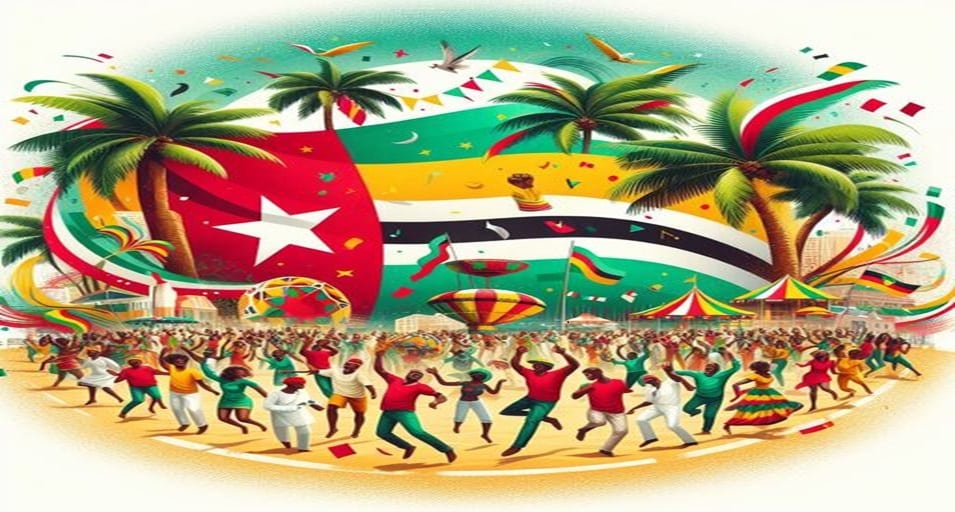Celebrating Guinea-Bissau Day of Independence

Guinea-Bissau, a vibrant nation on the west coast of Africa, marks a significant day in its history every year: Independence Day. This day is a heartfelt celebration of freedom, culture, and the enduring spirit of its people. It commemorates September 24, 1973, when Guinea-Bissau declared its independence from Portuguese colonial rule, a pivotal moment that shaped the country’s future. The journey to this day was filled with the aspirations and struggles of a people determined to self-govern and embrace their identity. Independence Day in Guinea-Bissau is not just a public holiday; it’s a day of unity, reflection, and joyous festivities that resonate with the beats of traditional music and the colors of the national flag. It’s a time when the streets come alive with parades and the air is filled with the scent of local delicacies, as the nation remembers the heroes who fought for the freedom they enjoy today.
HISTORY OF GUINEA-BISSAU INDEPENDENCE DAY
Guinea-Bissau’s Independence Day marks a pivotal moment in the nation’s history, a day that commemorates its emergence as a sovereign state after centuries of colonial rule. The road to independence was a long and arduous journey, fraught with struggles and sacrifices that are etched into the collective memory of the Bissau-Guinean people. The quest for autonomy began in earnest with the formation of the African Party for the Independence of Guinea and Cape Verde (PAIGC) by the esteemed Amílcar Cabral in 1956. This movement laid the groundwork for a sustained campaign against Portuguese colonial forces, culminating in a protracted war of independence that spanned over a decade.
The conflict, often referred to as “Portugal’s Vietnam,” was characterized by guerrilla warfare and significant political upheaval within Portugal itself. Despite the assassination of Amílcar Cabral in 1973, the PAIGC declared the independence of Guinea-Bissau on September 24 of the same year, a bold move that was recognized by several countries even before Portugal conceded sovereignty. The official date of independence, however, is celebrated on September 10, 1974, following the Carnation Revolution in Portugal, which led to a change in government and the eventual recognition of Guinea-Bissau’s independence. Independence Day in Guinea-Bissau is not just a reflection of a historical milestone; it is a day imbued with the spirit of ‘Unity, Struggle, and Progress’—the motto that encapsulates the enduring resilience and aspirations of a nation that fought valiantly for its right to self-determination. It is a time for the people of Guinea-Bissau to honor their past, celebrate their freedom, and look forward to a future of continued growth and development.
SIGNIFICANCE OF GUINEA-BISSAU INDEPENDENCE DAY
Guinea-Bissau Independence Day celebrated on September 24th, marks a pivotal moment in the country’s history. It is a day that commemorates the end of Portuguese colonial rule and the birth of a new nation. This day is significant because it represents the triumph of the people’s struggle for self-determination and freedom. The independence of Guinea-Bissau in 1973 was a result of years of conflict and negotiation, which finally led to the establishment of a sovereign state. It is a time for the people of Guinea-Bissau to reflect on their past, honor the sacrifices made by their ancestors, and celebrate the cultural heritage and national identity that has emerged since independence. The day serves as a reminder of the importance of unity, peace, and progress in building a prosperous future for all citizens. Celebrations typically include parades, cultural performances, and public speeches that highlight the country’s journey and aspirations. It is a day of pride for the people of Guinea-Bissau, as they look back on their history with respect and look forward to their future with hope.
GUINEA-BISSAU INDEPENDENCE DAY CELEBRATION
Guinea-Bissau celebrates its Independence Day on September 24th. This day marks the country’s declaration of independence from Portugal in 1973. It’s a day filled with pride, joy, and a strong sense of national identity for the people of Guinea-Bissau. The streets come alive with parades, music, and dance, reflecting the rich cultural heritage of the nation. Families and friends gather to enjoy traditional foods and share stories of the country’s history and the long struggle for freedom. It’s a time to honor the heroes who fought for independence and to teach the younger generation about the importance of this day. The flag of Guinea-Bissau, with its vibrant colors, is displayed prominently, symbolizing hope and unity. Independence Day in Guinea-Bissau is not just a public holiday; it’s a heartfelt celebration of freedom and a reminder of the resilience of its people.
FACTS ABOUT GUINEA-BISSAU INDEPENDENCE DAY
Here are some interesting facts about Saudi National Day:
- Guinea-Bissau gained full independence from Portugal on September 10, 1974.
- The struggle for independence began in 1959 and involved a protracted guerrilla war against Portuguese colonialists.
- Amílcar Cabral, a key figure in the independence movement, was assassinated on January 20, 1973, but the fight continued, leading to the declaration of independence on September 24, 1973.
- Independence Day is celebrated on September 24th and is marked by a carnival in Bissau, reflecting the Criolu cultural festival.
- The first president of Guinea-Bissau after independence was Luís de Almeida Cabral, the half-brother of Amílcar Cabral.
- Guinea-Bissau’s transition to a democratic, multiparty system occurred in the early 1990s, with the first free elections held in 1994.
- The country joined the West African Economic Monetary Union and the Franc Zone in 1997, which led to significant political changes and challenges.
- The motto of Guinea-Bissau is “Unity, Struggle, Progress,” which reflects the spirit of the independence movement.
Observer Voice is the one stop site for National, International news, Sports, Editor’s Choice, Art/culture contents, Quotes and much more. We also cover historical contents. Historical contents includes World History, Indian History, and what happened today. The website also covers Entertainment across the India and World.

